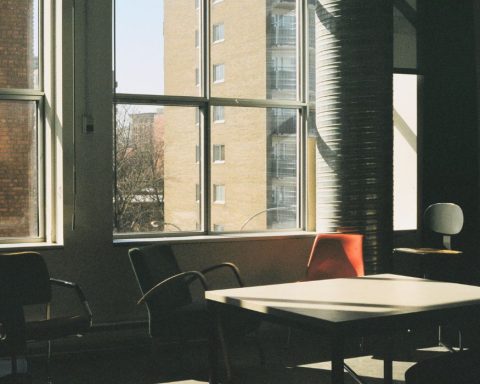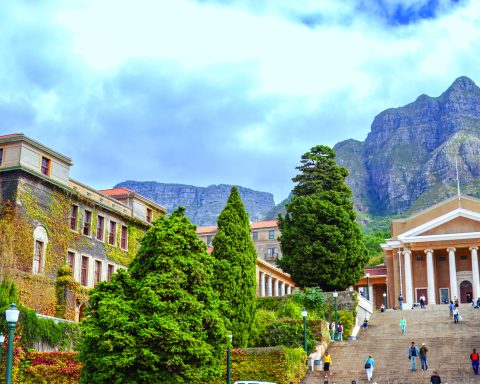It was a difficult choice, but in the end the team from Sweden took top prize. Three MBA student teams travelled to Davos, Switzerland, in late January to present how they believed Canadian energy giant Suncor Energy could become the most sustainably operated company among its sector peers.
They were there as part of the inaugural CK-Schulich Business for a Better World Case Competition. Having made it through two previous rounds, which whittled down a pack of 28 participating MBA teams, it came down to the final three – the Palumbo Donahue School of Business at Duquesne University in Pennsylvania, the Monterey Institute of International Studies at California’s Middlebury College and the Stockholm School of Economics in Sweden.
“To have got this far is a great compliment to you and the work you’ve done,” said Suncor chief executive Steve Williams before he and his fellow judges announced the winner. “Just for reassurance, I will take pieces from each of your presentations and they will be part of our plan of execution, and that is the greatest respect I can pay you.”
In addition to Williams, the judging panel included Dominic Barton, global managing director of McKinsey & Company; Robert Greenhill, managing director of the World Economic Forum; former State Street Global Advisors chief investment officer Sean Flannery, now vice-chairman of Corporate Knights; and Nicky Major, global corporate sustainability leader for Ernst & Young. Rounding out the panel was professor Dirk Matten, the Hewlett-Packard Chair in Corporate Social Responsibility at the Schulich School of Business at York University in Toronto.
Teams were required to assess Suncor’s global business operations, which are heavily weighted towards the oil sands, using the same 12 key performance indicators that Corporate Knights uses to determine its annual Global 100 Most Sustainable Corporations in the World ranking. They then had to identify which of the 12 were priority indicators and come up with a business plan that would turn Suncor into a top sustainability performer.
Given the location and high profile of the judging panel, all three teams entered the competition room a little nervous. When the clock started on each of their 10-minute presentations, all were impressively composed. But it was the professional touch from Team Stockholm – composed of Karin Bratt, Anja Huber, Johannes Julius Meder and Christopher Royle – that won over the judges.
Team Stockholm argued that Suncor should invest more into attracting diverse talent to its executive ranks. Reducing the gap between CEO and average worker compensation was highlighted as another way to up its score in the short term. The ratio, currently at 113:1, should be brought to within 30:1 and 50:1 to stay in line with top sector players, the team said.
Also, boosting investment in innovation was cited as crucial to improving Suncor’s resource productivity score – particularly related to energy use and emissions – over the longer term. “The competition was very well organized, and we very much appreciate the valuable feedback we received in the final stage,” said the team’s Christopher Royle.
Team Duquesne received $4,000 for second place, while third place Team Monterey was rewarded with $2,000. The prize money came from Suncor, which was the competition’s case sponsor. It was a close call for all three. For example, some judges were particularly impressed with the sophisticated sensitivity analysis (using the “Ginzu” model of firm valuation) carried out by Team Monterey.
The team looked at three scenarios – from business as usual to the International Energy Agency’s New Policies Scenario – to map out at what point it would be in Suncor’s financial interests from a future cash-flow perspective to divest from the oil sands altogether in favour of more profitable alternative energy.
Their answer: sometime between 2026 and 2038.
- CK Staff
- CK Staff
- CK Staff
- CK Staff
- CK Staff
- CK Staff
- CK Staff
- CK Staff
- CK Staff
- CK Staff
- CK Staff
- CK Staff
- CK Staff
- CK Staff
- CK Staff
- CK Staff
- CK Staff
- CK Staff
- CK Staff
- CK Staff
- CK Staff
- CK Staff
- CK Staff
- CK Staff
- CK Staff
- CK Staff
- CK Staff
- CK Staff
- CK Staff
- CK Staff
- CK Staff
- CK Staff
- CK Staff
- CK Staff
- CK Staff
- CK Staff
- CK Staff
- CK Staff
- CK Staff
- CK Staff
- CK Staff
- CK Staff
- CK Staff
- CK Staff
- CK Staff
- CK Staff
- CK Staff
- CK Staff
- CK Staff
- CK Staff
- CK Staff
- CK Staff
- CK Staff
- CK Staff
- CK Staff
- CK Staff
- CK Staff
- CK Staff
- CK Staff
- CK Staff
- CK Staff
- CK Staff
- CK Staff
- CK Staff
- CK Staff
- CK Staff
- CK Staff
- CK Staff
- CK Staff
- CK Staff
- CK Staff
- CK Staff
- CK Staff
- CK Staff
- CK Staff
- CK Staff
- CK Staff
- CK Staff
- CK Staff
- CK Staff
- CK Staff
- CK Staff
- CK Staff
- CK Staff
- CK Staff
- CK Staff
- CK Staff
- CK Staff
- CK Staff
- CK Staff
- CK Staff
- CK Staff
- CK Staff
- CK Staff
- CK Staff
- CK Staff
- CK Staff
- CK Staff
- CK Staff
- CK Staff
- CK Staff
- CK Staff
- CK Staff
- CK Staff
- CK Staff
- CK Staff
- CK Staff
- CK Staff
- CK Staff
- CK Staff
- CK Staff
- CK Staff
- CK Staff
- CK Staff
- CK Staff
- CK Staff
- CK Staff
- CK Staff
- CK Staff
- CK Staff
- CK Staff
- CK Staff
- CK Staff
- CK Staff
- CK Staff
- CK Staff
- CK Staff
- CK Staff
- CK Staff
- CK Staff
- CK Staff
- CK Staff
- CK Staff
- CK Staff
- CK Staff
- CK Staff
- CK Staff
- CK Staff
- CK Staff
- CK Staff
- CK Staff
- CK Staff
- CK Staff
- CK Staff
- CK Staff
- CK Staff
- CK Staff
- CK Staff
- CK Staff
- CK Staff
- CK Staff
- CK Staff
- CK Staff
- CK Staff
- CK Staff
- CK Staff
- CK Staff
- CK Staff
- CK Staff
- CK Staff
- CK Staff
- CK Staff
- CK Staff
- CK Staff
- CK Staff
- CK Staff
- CK Staff
- CK Staff
- CK Staff
- CK Staff
- CK Staff
- CK Staff
- CK Staff
- CK Staff
- CK Staff
- CK Staff
- CK Staff
- CK Staff
- CK Staff
- CK Staff
- CK Staff
- CK Staff
- CK Staff
- CK Staff
- CK Staff
- CK Staff
- CK Staff
- CK Staff
- CK Staff
- CK Staff
- CK Staff
- CK Staff
- CK Staff
- CK Staff
- CK Staff
- CK Staff
- CK Staff
- CK Staff
- CK Staff
- CK Staff
- CK Staff
- CK Staff
- CK Staff
- CK Staff
- CK Staff
- CK Staff
- CK Staff
- CK Staff
- CK Staff
- CK Staff
- CK Staff
- CK Staff
- CK Staff
- CK Staff
- CK Staff
- CK Staff
- CK Staff
- CK Staff
- CK Staff
- CK Staff
- CK Staff
- CK Staff
- CK Staff
- CK Staff
- CK Staff
- CK Staff
- CK Staff
- CK Staff
- CK Staff
- CK Staff
- CK Staff
- CK Staff
- CK Staff
- CK Staff
- CK Staff
- CK Staff
- CK Staff
- CK Staff
- CK Staff
- CK Staff
- CK Staff
- CK Staff
- CK Staff
- CK Staff
- CK Staff
- CK Staff
- CK Staff
- CK Staff
- CK Staff
- CK Staff
- CK Staff
- CK Staff
- CK Staff
- CK Staff
- CK Staff
- CK Staff
- CK Staff
- CK Staff
- CK Staff
- CK Staff
- CK Staff
- CK Staff
- CK Staff
- CK Staff
- CK Staff
- CK Staff
- CK Staff
- CK Staff
- CK Staff
- CK Staff
- CK Staff
- CK Staff
- CK Staff
- CK Staff
- CK Staff
- CK Staff
- CK Staff
- CK Staff
- CK Staff
- CK Staff
- CK Staff
- CK Staff
- CK Staff
- CK Staff
- CK Staff
- CK Staff
- CK Staff
- CK Staff
- CK Staff
- CK Staff
- CK Staff
- CK Staff
- CK Staff
- CK Staff
- CK Staff
- CK Staff
- CK Staff
- CK Staff
- CK Staff
- CK Staff
- CK Staff
- CK Staff
- CK Staff
- CK Staff
- CK Staff
- CK Staff
- CK Staff
- CK Staff
- CK Staff
- CK Staff
- CK Staff
- CK Staff
- CK Staff
- CK Staff
- CK Staff
- CK Staff
- CK Staff
- CK Staff
- CK Staff
- CK Staff
- CK Staff
- CK Staff
- CK Staff
- CK Staff
- CK Staff
- CK Staff
- CK Staff
- CK Staff
- CK Staff
- CK Staff
- CK Staff
- CK Staff
- CK Staff
- CK Staff
- CK Staff
- CK Staff
- CK Staff
- CK Staff
- CK Staff
- CK Staff
- CK Staff
- CK Staff
- CK Staff
- CK Staff
- CK Staff
- CK Staff
- CK Staff
- CK Staff
- CK Staff
- CK Staff
- CK Staff
- CK Staff
- CK Staff
- CK Staff
- CK Staff
- CK Staff
- CK Staff







